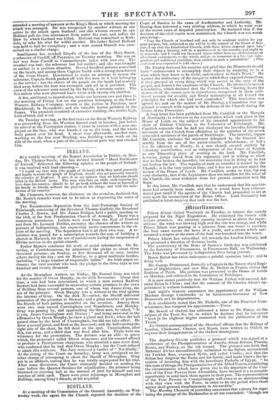SCOTLAND.
At a meeting of the Commission of the General Assembly, on Wed- iesday week, the agent for the Church reported the decision of the
Court of Session in the cases of Auchterarder and Lethendy. Mr. Dunlop then delivered a very stirring address, in which he went over all the recent cases of disputed presentation. He declared that if the decision of the civil courts were maintained, the Church was not worth preserving- " I say the Church of Scotland will not only be rendered useless for any good purpose, but, subjected as she will be to the control of the Court of Ses- sion, I say that the Established Church, with these fetters imposed upon her,' far from being a blessing, will be a positive evil to the country, and ought to be removed ; and 1 would ten thousand times rather have no establishment at all—throw endowments to the winds, and go on tomorrow in a free and inde- pendent and unfettered condition, than submit to such a jurisdiction." (This sentiment was responded to with cheers) Mr. Dunlop declared his surprise and grief that the Dissenters should have "endeavoured to accomplish their objects by retaining us in a state which they know to be sinful, and contrary to God's Word." He earned the aristocracy of the danger to which they exposed themselves, if they grasped at every thing which was sacred in the eyes of the people, and fettered the exertions of the Church. He afterwards moved a resolution, which declared that the Commission, "having beard the statement of the causes now in dependence, recognized in them addi- tional reasons for steadily and firmly maintaining at all hazard the principles for which she bad ever contended." This resolution was agreed to ; and on the motion- of Mr. Dunlop, a Committee was ap- pointed to consult with regard to the defence of the Church during the illness of the Procurator.
A long letter has been published from Mr. Candlish to the Marquis of Normanby, in reference to the conversation which took place in the House of Lords on the subject of his intended appointment to the chair of Biblical Criticism in the University of Edinburgh. Mr.. Candlish contends that he had not disobeyed the interdict forbidding ministers of the Church from officiating in the parishes of the seven suspended ministers of the parish of Strathbogie. The interdict, argues Mr. Candlish, excludes the ministers delegated by the General As- sembly from the use of the parish-church, school-house, or bell ; but he officiated at Huntly, in a new church erected entirely by voluntary contribution, and as independent of the Court of Session as any Dissenting place of worship in the land. Mr. Candlish, however, jumps round from this argument, and is willing to allow that be has broken the interdict, but maintains that in doing so he has not broken the law. The legality of such an interdict is denied by the
Church ; it is the very point at issue, and it has not yet come under the review of the House of Lords. Mr. Candlish seems to hint, but not very distinctly, that if the Legislature does notinterfere for the relief of the Church, she must withdraw from her present connexion with the State.
In this letter, Mr. Candlish says that he understood that his appoint- ment had actually been made, and that it would have been consum- mated past recall if the agents of the Church had proceeded to act at once upon the instructions of the Home Office. Lord Normanby has published a letter denying that such was the fact.


























 Previous page
Previous page